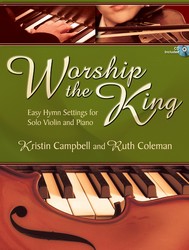- |
User Links
A Song to Creating Wisdom

Eternal wisdom, thee we praise
Author: Isaac Watts (1705)Published in 196 hymnals
Printable scores: PDF, MusicXMLAudio files: MIDI
Representative Text
1 Eternal Wisdom, thee we praise,
Thee the creations sing:
With thy loved name, rocks, hills, and seas,
And heaven's high palace ring.
2 Thy hand, how wide it spreads the sky,
How glorious to behold!
Tinged with a blue of heavenly dye,
And starred with sparkling gold.
3 There thou hast bid the globes of light
Their endless circuits run;
There the pale planet rules the night;
The day obeys the sun.
4 If down I turn my wandering eyes
On clouds and storms below,
Those under-regions of the skies,
Thy numerous glories show.
5 The noisy winds stand ready there
Thy orders to obey;
With sounding winds they sweep the air,
To make thy chariot way.
6 But the mild glories of thy grace,
Our softer passions move;
Pity divine in Jesus' face
We see, adore, and love.
Source: The Voice of Praise: a collection of hymns for the use of the Methodist Church #60
Author: Isaac Watts
 Isaac Watts was the son of a schoolmaster, and was born in Southampton, July 17, 1674. He is said to have shown remarkable precocity in childhood, beginning the study of Latin, in his fourth year, and writing respectable verses at the age of seven. At the age of sixteen, he went to London to study in the Academy of the Rev. Thomas Rowe, an Independent minister. In 1698, he became assistant minister of the Independent Church, Berry St., London. In 1702, he became pastor. In 1712, he accepted an invitation to visit Sir Thomas Abney, at his residence of Abney Park, and at Sir Thomas' pressing request, made it his home for the remainder of his life. It was a residence most favourable for his health, and for the prosecution of his literary… Go to person page >
Isaac Watts was the son of a schoolmaster, and was born in Southampton, July 17, 1674. He is said to have shown remarkable precocity in childhood, beginning the study of Latin, in his fourth year, and writing respectable verses at the age of seven. At the age of sixteen, he went to London to study in the Academy of the Rev. Thomas Rowe, an Independent minister. In 1698, he became assistant minister of the Independent Church, Berry St., London. In 1702, he became pastor. In 1712, he accepted an invitation to visit Sir Thomas Abney, at his residence of Abney Park, and at Sir Thomas' pressing request, made it his home for the remainder of his life. It was a residence most favourable for his health, and for the prosecution of his literary… Go to person page >Text Information
| First Line: | Eternal wisdom, thee we praise |
| Title: | A Song to Creating Wisdom |
| Author: | Isaac Watts (1705) |
| Meter: | 8.6.8.6 |
| Language: | English |
| Copyright: | Public Domain |
English
- A Baptist Hymn Book, Designed Especially for the Regular Baptist Church and All Lovers of Truth #d187
- A Book of Hymns and Tunes: for the Sunday-School, the Congregation and Home: 2nd ed. #31
- A Choice Selection of Evangelical Hymns, from various authors: for the use of the English Evangelical Lutheran Church in New York #14
- A Collection of Evangelical Hymns; made from Different Authors and Collections for the English Lutheran Church in New York #d60
- A Collection of Hymns Adapted to the Use of the Methodist Episcopal Church #d120
- A Collection of Hymns Adapted to the use of the Methodist Episcopal Church Including the Whole Collection of the Rev. J. Wesley #ad120
- A Collection of Hymns for Public, Social and Domestic Worship #d185
- A Collection of Hymns for Public, Social, and Domestic Worship #30
- A Collection of Hymns for Public, Social, and Domestic Worship #d184
- A Collection of Hymns for the Sanctuary. Rev.ed. with a Supplement #d18 10 shown out of 100
Latin
Notes
Eternal Wisdom, Thee we praise. I. Watts. [Praise to the Creator.] 1st published in his Horae Lyricae, 1705, as "A Song to Creating Wisdom," in 18 stanzas of 4 lines, divided into five parts, and repeated in later editions of the same, and in Watts's complete Works. Centos from this poem, all beginning with the first stanza, are numerous, specially in the American hymn-books. J. Wesley set the example by giving 12 stanzas in his Psalms & Hymns, 3rd ed., 1743. This arrangement was republished in the Wesleyan Hymn Book, 1780, No. 217 (revised ed. 1875, No. 226), and in several other collections. Usually, however, the centos are much shorter than this, from 4 to 6 stanzas being the rule.
--John Julian, Dictionary of Hymnology (1907)
Tune
KENSINGTON (Braine)AZMON
Lowell Mason (PHH 96) adapted AZMON from a melody composed by Carl G. Gläser in 1828. Mason published a duple-meter version in his Modern Psalmist (1839) but changed it to triple meter in his later publications. Mason used (often obscure) biblical names for his tune titles; Azmon, a city south of C…
DUNDEE (Ravenscroft)
DUNDEE first appeared in the 1615 edition of the Scottish Psalter published in Edinburgh by Andro Hart. Called a "French" tune (thus it also goes by the name of FRENCH), DUNDEE was one of that hymnal's twelve "common tunes"; that is, it was not associated with a specific psalm. In the Psalter Hymnal…


 My Starred Hymns
My Starred Hymns






